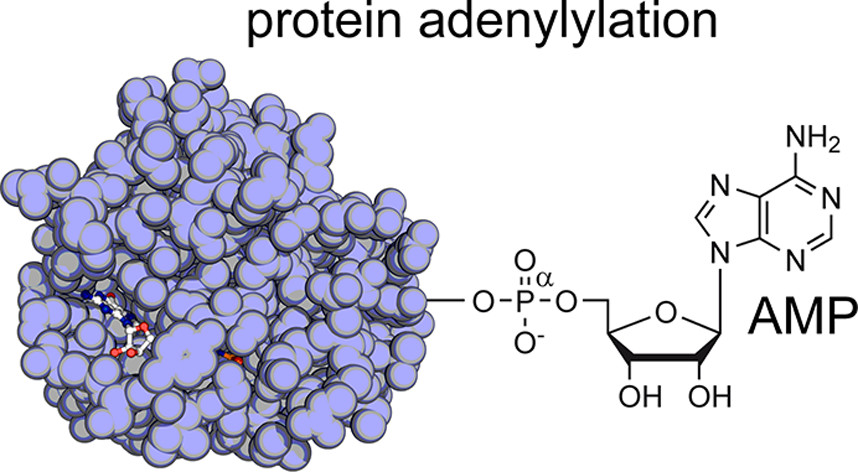Adenylylation Proteomics Service
Adenylylation Proteomics Service is a mass spectrometry-based, high-throughput protein modification analysis service that focuses on the identification and quantification of adenylylation (AMP modification) in proteins. It can be used to investigate the functional roles of adenylylation in biological processes such as immune regulation, host-pathogen interactions, and cellular stress responses, and also supports disease research and drug target validation.

Hedberg C. Itzen A. ACS Chemical Biology. 2015.
Adenylylation is a relatively underexplored type of post-translational modification (PTM), in which an AMP molecule is covalently attached to serine (Ser), threonine (Thr), or tyrosine (Tyr) residues of a protein. This modification plays a crucial regulatory role in modulating the functional state, interaction capacity, and signaling activity of target proteins. Adenylylation has been observed in both prokaryotic and eukaryotic organisms and has been confirmed to participate in immune regulation, cellular stress responses, bacterial virulence factor control, and viral infection. For example, GS-ATase (glutamine synthetase adenylyltransferase) regulates the activity of glutamine synthetase through adenylylation; in viral infections, certain pathogenic proteins can suppress host antiviral responses via this modification. Therefore, conducting Adenylylation Proteomics is of great significance for understanding the PTM network and discovering novel biomarkers.
Due to the low abundance and structural diversity of AMP modifications, traditional detection methods face considerable challenges. Covalent attachment of an AMP group increases the mass of modified peptides by +329.0525 Da. Additionally, this modification produces characteristic AMP-specific diagnostic ions (e.g., m/z 136.06, 348.07) in MS/MS analysis. Thus, the use of high-resolution mass spectrometry combined with targeted data analysis strategies enables highly sensitive detection and precise localization of adenylylation modifications.
Leveraging advanced mass spectrometry platforms, MtoZ Biolabs offers Adenylylation Proteomics Service to specifically identify and quantify adenylylation modifications across the proteome, providing data support for basic research, mechanistic studies, and drug target validation.
Analysis Workflow
The main workflow of Adenylylation Proteomics Service is as follows:
1. Sample Preparation
Protein samples are extracted and subjected to reduction, alkylation, and enzymatic digestion to generate peptides.
2. Enrichment of Modified Peptides (Optional)
Depending on project requirements, adenylylated peptides can be enriched using strong cation exchange (SCX) chromatography or anti-AMP antibody enrichment.
3. Mass Spectrometry Detection
High-resolution mass spectrometry (LC-MS/MS) is used to detect peptides and capture characteristic AMP modification signals.
4. Modification Site Identification
Adenylylation sites are localized through database searching and diagnostic ion screening.
5. Data Analysis
Quantitative analysis is performed along with GO/KEGG pathway annotation to uncover the functional and biological significance of the modifications.
Applications
Adenylylation Proteomics Service is applicable to a variety of research areas:
Cell Signaling Studies
Reveal the regulatory roles of adenylylation in signal transduction pathways.
Pathogen Infection Mechanism Studies
Analyze how bacteria or viruses manipulate host protein function through adenylylation.
Drug Target Validation
Identify disease-associated adenylylated proteins as potential therapeutic targets.
Protein Function Studies
Investigate the impact of adenylylation on protein activity, stability, and interactions.
Biomarker Discovery
Screen for adenylylated proteins associated with specific disease states for use as diagnostic or prognostic biomarkers.
Deliverables
1. Comprehensive Experimental Details
2. Materials, Instruments, and Methods
3. Total Ion Chromatogram & Quality Control Assessment (project-dependent)
4. Data Analysis, Preprocessing, and Estimation (project-dependent)
5. Bioinformatics Analysis
6. Raw Data Files
FAQ
Q. How to Ensure the Dpecific Identification of Adenylylation Modifications? Can It be Effectively Distinguished from Similar Modifications such as Phosphorylation?
We ensure specificity by applying a +329.0525 Da mass shift exclusively for AMP modification identification, combined with the presence of diagnostic ions (e.g., m/z 136.06 and 348.07) in MS/MS spectra. In addition, the use of both higher-energy collisional dissociation (HCD) and electron transfer dissociation (ETD) further enhances spectral interpretation. All modified spectra are validated through a dual strategy of automated scoring and manual review to ensure accuracy and reliability, while minimizing the risk of misidentification with other modifications such as phosphorylation.
Q. How can the Detection Rate of Low-Abundance AMP Modifications be Improved? Is Peptide Enrichment Supported?
To address the challenges of low natural abundance and weak signal intensity of AMP modifications, we offer multiple enrichment strategies, including anti-AMP antibody-based immunoenrichment, strong cation exchange (SCX) chromatography, and novel click-chemistry labeling methods to enhance the enrichment efficiency of modified peptides in complex matrices. Depending on the project type, we can also perform parallel analyses before and after enrichment to comprehensively evaluate coverage depth and enrichment performance, ensuring high-sensitivity detection.
How to order?







